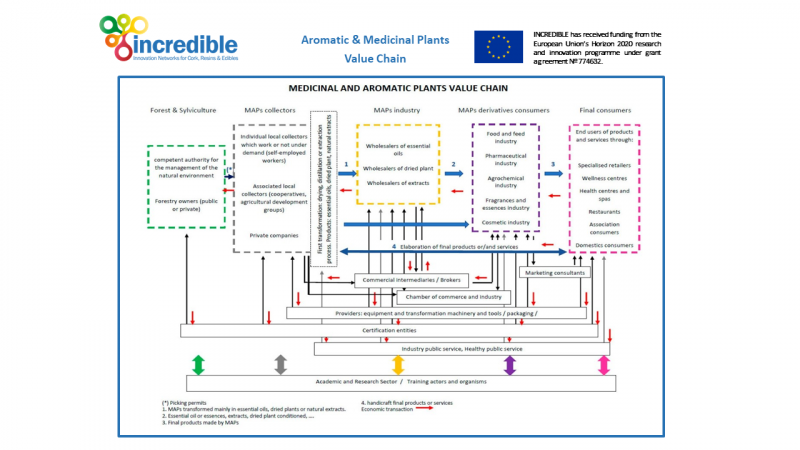Roadmap
Aromatic and medicinal plants (AMP) products are widely used in the perfume, cosmetics, food and pharmaceutical industries. These different market segments are very different in terms of value chain actors, volumes traded, relevance of national or international markets or quality requirements. While some plants or their extracts are cultivated, there is still a very significant portion of wild aromatic plants that are collected in forests and scrublands. Some of the wild plants more commonly traded for are lavender (Lavandula spp.), everlasting (Helichrysum spp.), sage (Salvia spp.), laurel (Laurus nobilis), myrtle (Myrtus spp.) and rosemary (Rosmarinus officinalis).
The AMP iNet the focus is on wild plants that make essential parts of Mediterranean forest/scrublands ecosystems. Often, they grow on the most degraded lands, and hostile conditions, unsuitable for classical forest or agricultural production. Despite their natural resilience to harsh environmental conditions, they are affected by climate change and can be affected by unsustainable harvesting levels and/or procedures.
There is an increasing interest worldwide in aromatic and medicinal plants as natural medicinal remedies, for their use in thermal treatments and as ingredients for natural cosmetics. This global trend is reflected in a growing demand for AMP products in the European markets that are becoming more sophisticated and demanding in terms of quality of products and reliability of supply. Other requested attributes are sustainability, social equity and wildness. They are becoming highly demanded in at least some high added-value market segment. All actors in the AMP value chains are increasingly required to address consumers’ expectations (e.g. in relation to traceability, development of niche products) while also facing changes in consumer preferences, and increased global competition. Some high demanding sectors (e.g. perfume and cosmetic industries) are stretching to the limits the capacity of producers to supply essential oils based on wild-collected plants in quality, quantity and price. This rapidly evolving market situation and the menace of climate change pose significant challenges and opportunities for resources managers, collectors, processors and distributors.
During the celebration of the Scoping Seminars, some work sessions were held to identify the priority themes to focus Aromatic & Medicinal Plants iNet actions and four key themes were identified:
- Supporting production and marketing capacities
Essential oils production is constrained by price variability on international market, continuity of internal supply and quality concerns. Lack of marketing information on domestic and international market: new trends in major consumer markets still unknown Participants mention that botanical and agronomic research needed to focus on identifying and optimizing AMP production and value added opportunities.
- Natural Resource Management and biodiversity conservation
The AMP sector’s livelihood depends on sustainable management of vegetative material. Wild plants are susceptible to overharvesting and collectors seek to maximize quantity (and therefore income) in a short period of time. The important economic value of AMPs is not translated into incentives for sustainable management, much less biodiversity conservation. There is no incentive to improve harvesting behavior. These initiatives should be implemented from downstream value chain actors.
Biodiversity is an important resource in the search of new products. The Mediterranean region’s rich biodiversity favors it as a source of innovation. Participants in the scoping seminar indicate that the greatest incentives for conservation of biodiversity can come from bioprospecting. Diverse plant species still unexploited which present new opportunities for firms.
- Traceability
Traceability was mentioned as one of the most priority themes in the AMP sector. The adoption of geographical indication and apellations of origin is indispensable for more consistent quality control and development of standards. Setting up geographical indications is very useful method of indicating the origin of goods and services. Participants indicate that a geographical indication must be available for use by all producers of essential oils in that region, for instance small producers and local population. Indeed, using a certification mark is sometime restricted to big producers and processors who comply with the established standards for its use.
Participants mention the importance of an appellation of origin for certain products and they explain that certain plants owe their special qualities to the place from which they come.
- Legislative framework
In the case of Tunisia, production is mostly coming from lands controlled by the State: resource use rights and harvesting of aromatic and medicinal plants are subject to a public tender (Article 18 of the Tunisian forestry code) organized each year by the Tunisian Forestry authority for the private firms to collect plants. A rigid legislative framework can be a handicap to access the natural resource (as product resource).
The AMP sector suffers from a lack of access to financing. Indeed, the sector is perceived as too unpredictable and high risk by the formal banking system and the mircro-credit sector. Local population and small processors are excluded of the banking system. Donor projects, NGOs are the unique sources of external liquidity and funds for this category of producers (local population and Agricultural development group).

LE PROPOS
Le projet INCREDIBLE vise à montrer comment les produits forestiers non ligneux (PFNL) peuvent jouer un rôle important dans le soutien à la gestion durable des forêts et au développement rural, en créant des réseaux pour partager et échanger des connaissances et des compétences. INCREDIBLE (dont l’acronyme signifie “ réseaux d’innovation du liège, des résines et des produits comestibles dans le bassin méditerranéen» encourage la collaboration intersectorielle et l’innovation, afin de mettre en valeur la valeur et le potentiel des PFNL dans les régions méditerranéennes.
Funding
 Le projet 'Innovation Networks of Cork, Resin, and Edibles in the Mediterranean basin' (INCREDIBLE) a reçu des fonds du programme Horizon 2020 de la Commission Européenne sous le grant agreement N°774632
Le projet 'Innovation Networks of Cork, Resin, and Edibles in the Mediterranean basin' (INCREDIBLE) a reçu des fonds du programme Horizon 2020 de la Commission Européenne sous le grant agreement N°774632
Contact
Email: info@incredibleforest.net or use the contact form.
We welcome your feedback!






